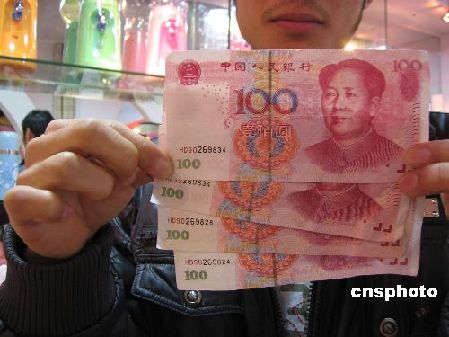 |
|
A shop owner shows the counterfeit cash he received in Nanning of Guangxi Zhuang Autonomous Region, January 9, 2009. [File photo] |
A Shanghai court sentenced a farmer from south China to 10 months in prison yesterday in what may have been the city's first criminal case involving a flood of high-quality 100 yuan (US$14.50) banknotes that is worrying financial officials across China.
The Nanhui District People's Court also fined the defendant, Mo Qinsong, 15,000 yuan for passing counterfeit currency.
The Shanghai court heard that Mo bought the notes for 5,500 yuan from a man near the Guangzhou Railway Station in Guangdong Province on November 9 and later came to Shanghai. He reportedly paid 10 yuan for each 100-yuan note.
On November 13, he went to a jewelry store in Nahui's Zhoupu Town and asked to buy a gold necklace priced at more than 5,200 yuan, offering mostly fake bills.
Though the notes passed the counterfeit-cash detector without alarm, the shop assistant thought they felt different from real ones and called the manager. When Mo was asked where he got the notes he panicked, tried to take the money back and ran out of the shop. But he was caught by the shop's security guards.
The notes were found to be fake, with all serial numbers beginning with "HD90."
Fake 100-yuan notes, most starting with the serial number "HD90," have been reported in more than 10 Chinese provinces and cities.
The counterfeit bills, which can pass through older counterfeit-cash detectors, may be from Taiwan, media reported. Police there cracked a six-member counterfeiting ring, seizing 100 million yuan in fake notes on October 8, according to Fujian-based Southeast TV.
Meanwhile, police in Jinan, capital of Shandong Province, busted a gang that had a large amount of 100-yuan "HD" counterfeit bills.
And a suspect in Nanning, capital of Guangxi Zhuang Autonomous Region, was apprehended for possessing more than 40 fake 100-yuan notes.
In addition, a vendor marketing HD notes online disclosed that he sold millions of yuan in bogus bills every day, Shenzhen Satellite Television reported.
Potential buyers could contact counterfeiters via online instant messaging tools. Vendors displayed their products using Webcams, according to media reports.
The Shanghai Headquarters of the People's Bank of China said on Monday that it had strengthened cooperation with public security and commerce authorities to combat counterfeiting, especially in the runup to this month's Spring Festival.
The local office of the central bank also ordered commercial banks to upgrade their counterfeit-detection systems.
The bank has provided tips on how to distinguish the fake notes. Among them, the metal strip in real cash is complete while it is broken in the counterfeits. Also, the watermarks on fake bills aren't as clear as they are on real cash.
(Shanghai Daily January 14, 2009)